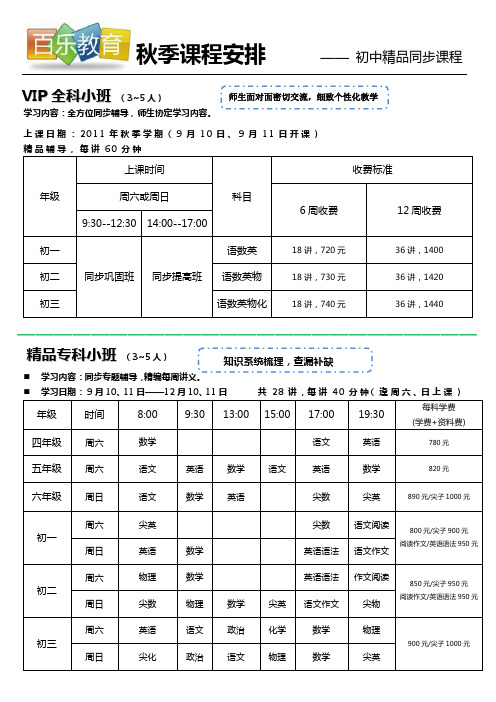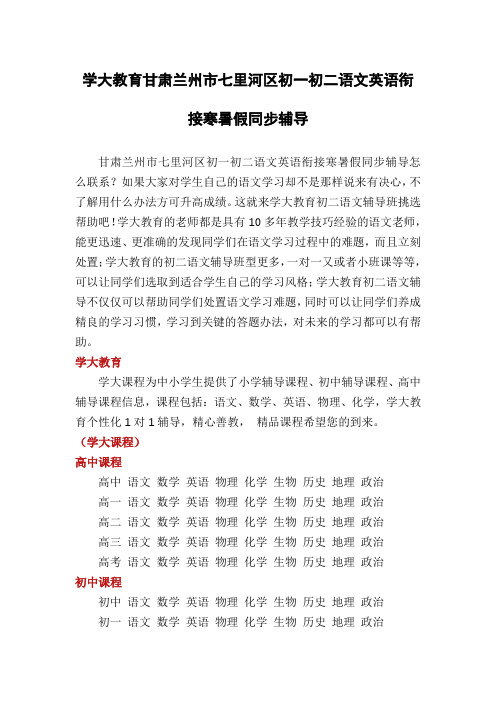初二英语同步辅导教材
- 格式:doc
- 大小:29.50 KB
- 文档页数:4

英语课程体系一、自然拼读5个级别教学大纲Level 1 26个字母发音alphabets Level 2 短元音short vowelsLevel 3 双元音和长元音diphthongs and long vowels Level 4 混合辅音consonantblends Level 5 字母组合letter combinations 详细的课程体系和课程大纲:●8节课学习26个字母名、字母形、字母音;掌握每个字母对应3个发音单词,包括音、义、形识读;能够流利朗读字母歌谣;流利朗读简单故事●10节课掌握5个短元音的字母名、字母形、字母音以及简单的拼读能力;掌握11个双元音的字母名、字母形、字母音以及简单的拼读能力;自主拼读115个单词,自主拼读词汇歌谣和故事,掌握sight words●5节课掌握9个双元音的字母名、字母形、字母音以及简单的拼读能力;掌握6个双辅音的字母名、字母形、字母音以及简单的拼读能力,自主拼读78个单词,自主拼读词汇歌谣和故事,包括课外绘本故事●10节课掌握28个双辅音的字母名、字母形、字母音以及简单的拼读能力;掌握11个三字母组合的字母名、字母形、字母音以及简单的拼读能力,自主拼读155个单词,自主拼读词汇歌谣和故事,包括课外绘本故事,掌握sight words二、Kids Brown 布朗儿童英语布朗儿童英语是专门针对亚洲儿童研发的美式母语化课程、多媒体互动课程,分为四个级别;Level One、Level Two、Level Three、Level Four,分别适合2至6岁儿童使用;每个级别10个主题,每个学期5个主题,每月1个主题;每学期包含5本手绘本故事书Story Book、5本作业书Student Book,一张音听CD,一张多媒体软件CD-ROM供家庭学习使用;布朗英语儿童英语的理念是Make English Practical,Make English Easy,Make English Fun,即实用、易学、乐学;布朗儿童英语特色在于应用多媒体互动软件,创设美式母语化体验式学习环境,让儿童自主学习,在游戏中学习,在互动中学习,启发兴趣、寓教于乐,听说读写,轻松掌握;适用年龄:3-6岁课程特色:1.自然拼读教学方法,见词能读听音会写;运用北美英语母语国家的学习方式,通过“拼读”学习英语读音与拼字而非靠“背”,让儿童在轻松愉快的氛围中,简单高效地学习英语的发音规则与拼读技巧,真正的做到“见词能读,听音会写”,并以此增进阅读能力与理解能力;2.特色歌曲律动,启发兴趣寓教于乐;贴合主题重点的特色歌曲律动,丰富的游戏、精巧的设计、可爱的形象,色彩、音乐、律动等多感官刺激;让儿童在快乐中接受、理解和掌握英语;课程主题Level 1课程目标:积累词汇Level1是为初学布朗英语第一阶段的儿童所设计,以及针对学前2-3岁儿童所设计;这个阶段是幼儿词汇量迅速增长的时期,表达的形式主要是对话言语;因此教材根据幼儿喜欢的事物为主题,以单词、简单的句型为主开展课程;Level 2课程目标:表达能力Level2是为学习布朗英语第二阶段的儿童所设计,以及针对学前3-4岁儿童所设计;这个阶段是儿童语言表达能力飞速发展的阶段;儿童已经具备了正确发出全部音节的生理条件,语言的影响逐渐降低,按句法进行反应的能力不断提高;因此教材内容根据儿童生理发展特点提供更多的单词及完整句子,满足幼儿表达能力的需要;Level 3课程目标:自我意识Level3是为学习布朗英语第三阶段的儿童所设计,以及针对学前4-5岁儿童所设计;这个阶段是儿童自我意识迅速发展的阶段,基本上能对大部分简单句按句法进行正确理解,还能用完整句子较连贯地讲述自己经历的事和图片上的内容,会有表情地朗诵儿歌和复述故事;因此教材中的故事内容会更多,所学句型也会更长;Level 4课程目标:综合能力Level4是为学习布朗英语第三阶段的儿童所设计,以及针对学前5-6岁儿童所设计;这个阶段是儿童语言综合能力迅速发展的阶段;儿童能在掌握大量的词汇和句子的基础上,有意识地将它们进行组合,会话性讲述能力明显进步;因此,教材中的故事主要以记叙文及复合文为主;授课流程:1.Warm Up 热身律动;通过与所讲主题、单词句型紧密联系的歌曲律动,调动学生的情绪状态,让学生最快进入学习情景,轻松快乐学习;2.Word Box 生词学习;简单的口语交流问答后学习新授单词,提炼其中重点生词,运用制作的闪卡选用实际生活中例子举例进行对话练习;3.Story Box 主题故事;贴合主题与内容的故事以图片及动画的形式,演示如何在实际生活中进行对话,以此培养儿童的想象力和创造力;4.Talk Box 对话练习;主题故事中所有重点句型以情景对话的形式展现,让儿童在学习的过程中达到能自然地用英语交流的目的;5. Phonics自然拼读操;通过肢体语言自然地将字母的“音”“形”相结合,生动有趣地记忆字母、单词的发音与拼写;6.Reading 阅读;将课件与书结合,并选择当下最新最适用于儿童教学的韵律强化听力训练;7.Fun Box 趣味游戏;选用与主题相关的多种智力游戏穿插在课件里,生动地演示复习重点句型及语言点;8.Goodbye Song 再见律动;选用非英语母语国家流行歌曲Super Simple Song作为再见律动,通过音乐和生动活泼的动作再次调整儿童情绪状态,轻松快乐地结束课程;三.探索岛屿Our Discovery Island课时:90分钟/课一个课件四个课时完成一周两次课8个单元+4个测试=36课时临近考试再赠送4课时的校本同步课程课程目标:让学生进入全英文的互动环境,寓教于乐,了解英语的发音规则,学习学校课本的同时,掌握地道的原汁原味的英语;课程特点:1 朗文探索青少年英语,美国培生朗文历时多年研发,并由全球知名教育学习者David Nunan教授指导,专业编辑团队编写,并融合亚洲各地具代表性的英语教学顾问群意见,为适应21世纪的技能培养需要以及数字化学习的趋势,最新推出的少儿英语教材;2 教材以学习及探索的理念,通过英语互动活动,完成各个主题岛屿的任务,发展孩子的认知,情感,社交等全方位技能;3 结合日常生活情景,故事教学,价值观教育,跨学科教学及字母拼读教学,利用动画,在线游戏提供全面的英语环境,彻底激发孩子的学习兴趣;内容涵盖:1 Free time 最常用的话题描述2 Wild animals 动物的名称以及习性3 The seasons 自然科学,四季的特点,天气的描述4 My week 日常生活的简单描述5 Job 工作的种类及如何询问6 In the rainforest 自然科学,气候特征7 Feelings 学会用形容词描述心情8 Actions 户外活动的各种表达课程的主要部分:1 口语互动What do you like doingI like playing the guitar.2 固定词组及日常用语的学习skipping, reading magazine, walking the dog, riding a scooter3 听力训练,配有图文4 阅读理解,可以跟读复读5 主题写作,思维拓展学写作6 自然拼读,见词会读,听音会写6 英文趣味故事欣赏,漫画形式7 趣味性练习题8 学生课下也能利用课件,将跟读,角色扮演进行到底;探索岛屿全新特色:1.原创故事演绎:每单元都具备有趣的原创漫画,激发学习兴趣2.日常生活实用技能:帮助学生学会实际应用所学知识3.价值观教育:学习语言的同时也帮助学生树立正确的价值观4.跨学科教学:综合英语和其他学科,满足学生探索未知世界的好奇心5.字母拼读教学:以科学合理的顺序学习拼读发音规则6.更丰富的词汇语法:词汇句型全面覆盖国家课标,学习效果更突出7.清晰的单元学习架构:以循序渐进方式清晰安排学习过程,更易使用8.学生互动 cd-rom:以互动学习软件解决家庭复习难题9互动白板教学软件:更易用的互动白板软件呈现更有趣的课堂教学10.创新性的在线游戏学习中心:前所未有的在线游戏学习体验11.DVD动画:有趣的原创动画,还有追加的真人表演哦12.丰富的教学资源:提供最为详尽的各类测试卷及教学资源四.青少版新概念小学只开设入门级A/B,1A/1B,2A/AB课程特点:①内容全面涵盖新英语课程标准1-5级的要求②遵循的是“先听后说,先说后读,先读后写”的渐进性原则,所以每单元都从听力理解开始,进而依次引入语言表达、阅读和写作的训练;③凡涉及新的语法结构,都会循环不断地复习前面学过的语法知识;④在秉承新概念英语先进教学理念的基础上,针对青少年的身心特点,采用了和生活,学习密切相关的语言材料,精心设计的听力、口语、阅读和写作练习帮助青少年扎实地掌握各项英语知识和能力,使他们能够逐步充满自信地运用英语进行交流⑤课程加入了自然拼读的概念,循序渐进的学英语拼读规律,做到“见词会读,听音会写”;五.初高中专项培优课课程简介本课程依托初中英语课本,结合中考大纲方向,将中考的知识点以写作、阅读、完形、听力、语法等形式分项串联,加以口语训练,掌握初中英语知识重难点,备战中高考;课程目标掌握英语学科重难点,备战重点高中和高考;课程特色1.小班教学,保证每个孩子都有充分的发言机会;2.专业的中考命题小组制作课件,紧扣中考考点,课后还有专业的中教老师,随时为孩子解疑答惑,让孩子轻松备战中考;3.除常规考点知识点,本课程还大量添加雅思口语基础,让孩子轻松应对各种口语考试;课程形式1、招生对象:初一、初二、初三学生2、课程内容:循序渐进学习40个中考考点+雅思口语基础3、上课形式:网络授课,90min/课时,1课时/周4、班级人数:一对一;小班教学 3~ 5人课程安排。

英语教学的随笔反思5篇英语教学的优秀随笔反思1作为一名初中英语教师,从事教学工作有_年了,在这期间有过失败的悲伤,但也有成功的喜悦,在那里,我把在英语教学的一些感悟写出来和大家共享.俗话说:〝好的开头是成功的一半.〞英语教学更要从头抓起.我以为应注重以下两个方面.1.培养学生的情感.在学期初的时候,教师要尽快认识每一个学生,了解每一个学生,要多和他们接触,让学生对老师有亲近感,信任感,让他们在学习或生活中有困难时愿意向你诉说,向你求助.这种信任的情感必定影响他们对英语学科的情感,而且对于你所讲的知识他们会更有兴趣,更愿意理解.因为〝亲其师,信其道〞.了解学生的英语学习状况.在学期初的时候,要多和学生谈心,明白他们是否喜欢英语,是否擅长英语,了解他们在学英语方面的困难,并表示愿意尽最大的努力帮忙他们学好英语.有了对学生的了解,教师在以后的教学中更能有的放矢,因材施教,针对他们的弱点,帮忙其提高,改善.初三学生的英语基础参差不齐,学单词,记单词的潜力也差异很大.我以为潜力差的学生主要是没过音标关,对于单词的发音规则不了解,从而导致很难记住的单词的发音,结果单词读不上,课文也就读不上,同时还听不懂别人说的英语.至于单词拼写不明白按发音去记忆,完全靠死记硬背,结果费了很大劲才背上的单词很快又忘了.如此时间长了,必然导致对英语兴趣的丧失.针对这一现象,我认为务必帮忙每个学生过音标关,因为音标是学生学习英语的拐杖,必需教会他们这个必备的工具.我经常对学生讲,正如砖头是建造高楼大厦的必备的基本材料一样,英语单词就是英语这门学科的最基本的材料.在很大程度上英语词汇量的大小决定着英语水平的高低.而新课标对于词汇量提出更高的要求.在这样的状况下,过单词关显得尤为重要.在学生掌握音标和简单的发音规律之后,他们读背单词的难度会降低很多.老师在教单词时应让学生自己先根据音标拼读,然后老师再纠正,领读.这样做能够让学生有成就感,他们会因为在老师未教的时候就能读单词而兴奋,从而激发他们学英语的兴趣.老师必须要强调学生在会读单词的基础上,根据发音规律去记忆单词.这样才能做到事半功倍.为防止遗忘,要让学生过一段时间就复习巩固一下,并且老师要经常提背,默写,督促其背默.四.注重课堂的趣味性,激发学生的兴趣人们常说,〝兴趣是最好的老师〞.有了兴趣,学习才能用心主动,才能在课堂上,持续高度的注意力,才会有高效的学习.初三英语课因为课堂密度大,语法讲解较多,容易让学生觉得英语课枯燥无味.针对这种状况,就要求老师更要注意课堂的趣味性.英语课堂要体现学生的主体作用,营造简单愉快的课堂气氛,注重和学生情感的交流.在英语教学中要抓住知识和学生的生活共鸣之处,挖掘教材中的生活因素,并和谐地与学生的生活经验相结合,创设学习气氛激发学习兴趣.此刻用的牛津版教材,每个单元都谈一个和学生生活相关的话题,相对来说学生的兴趣较浓,老师在课堂上要引导他们多开口.可用小组讨论,两两讨论,学生单独发言等方法鼓励他们说说自己身边的人和事,让生活走进课堂,这样能够激发学生的兴趣,活跃课堂的气氛..老师要注重让学生不断获得成功感.教师要善于抓住学生在学习中的闪光点,适时适宜地表扬鼓励.比如一段好的对话,一次测验的好成绩,都能够成为表扬他们的原因.在课堂上教师要经常用鼓励性语言,如对回答问题好的学生说:verygood.great.you’reveryclever.有时甚至还能够借用于同学的掌声进行鼓励.〝十次批评,不如一次表扬.〞多次的鼓励性的刺激,能够使学生感受到成功的乐趣,进而产生兴趣,激励学习动机.热爱英语课堂.五.注重英语口语的培养学生学习语言的最终目的是在以后的工作.生活中能够用英语这个工具与人交流.因此,从学生的未来思考,要求老师在教学中注重学生口语的培养.另外,明年江苏省中考将按照〝人机对话〞的模式对学生进行口语测试,这对初中英语的教学,个性是口语教学提出了更高的要求.因此,从应对中考这个角度来思考也要求注重口语的培养.要培养学生的口语潜力,这就要求老师不断提高自身的口语表达潜力,并且在上课时,尽可能多地用抑扬顿挫.语调丰富的英语并配以丰富的表情和手势来组织课堂教学.用风趣.幽默,往往充满诱因或悬念的语言,给学生创造一个开放宽松的学习环境,使他们受标准发音的熏陶,感受到语言的魅力,从而〝想说英语〞,增强听力和口头表达潜力.为提高学生的口语水平,老师在教学中也要经常让学生听标准的英语发音,并模仿其语音.语调.这样做,学生能够纠正自己的语音.语调,说出更地道的英语.老师还应注意随时随地给学生创设最佳的语言环境,让学生有身临其境的感觉,让他们感到英语无处不在,随时培养学生的英语口语潜力,以此来弥补缺少语言环境的遗憾.老师能够在教室的墙壁.板报等地方贴上一些英文的标语,写一些激励性的语言,例如〝studywell,andmakeprogresseveryday〞,〝learntolive,livetolearn〞,〝knowledgeispower.〞等.我以为老师还应当让学生有充分展示自己的空间.可透过课前三分钟的freetalk来巩固所学知识,激发学生兴趣,提高口语表达潜力.在口语训练过程中允许学生出错.对于初学者来说错误在所难免.纠错时多激励少训斥,不同的错误施以不同的纠正方法和尺度.肯定他们的参与性,不挫败他们的用心性.学生在讨论和练习过程中,教师应给予耐心的指导,帮忙他们克服害羞和焦虑心理,尽量让他们体验到学习语言的成就感,不再惧怕当众说英语.老师要多注意那些不肯开口的学生,在课堂上多提他们回答一些简单的问题.利用课堂提问.课后谈心的方式鼓励他们多开口.对他们说明讲英语的重要性,并且告诉他们:〝你的英语讲得很好.〞要树立他们的自信心.六.注重阅读题解题方法的指导阅读潜力的培养是初中英语学习的一项重要任务,是《英语课程标准》中听说读写中的重要技能之一,也是中考的一项重要考试资料.因此,阅读潜力的培养在初中英语教学中显得尤为重要.老师在文章选材方面注意,题材广泛,包括科普,社会,文化,政治,经济等,注意让学生了解与外国文化背景相关的知识.文章体裁要多样化,包括记叙文,说明文,应用文,图表题等.在讲解阅读理解文章时,注意教会学生一些基本的阅读方法和技巧.例如:怎样获取段落的主旨和大意?如何根据上下文猜测词义?如何确定细节和事实?如何进行推断?对于完型填空题,有不少同学为了求速度,习惯拿到题目就做,总是边看文章边做题,结果往往是只见树木不见森林,错误百出.这种坏习惯自初一.初二时开始养成,根深蒂固,很难纠正.针对这样的状况,要求老师在学生做题和自己讲课时注意教会其正确的做题方法.强调必需先通读全文,再根据上下文找出正确的选项.在选取时注意从意思和语法双方面去思考.在复查试卷时,再把选出来的词带到文章中仔细推敲.平常必须要多训练,强行使其入轨.经过长期的训练,可使学生养成良好的阅读习惯.对于根据文章完成句子的题目,我要求学生在读完全文,了解大意的前提下,先把要完成的句子全部看一下,做到心中有数.做题时,结合文章定答案,对于能直接找到的答案可在文章中划出来,再抄写到答题纸上.对于不能直接找到的答案,要细看题目,再看文章,从文章意思和语法结构双方面思考定答案.解这类题目时,老师必须要强调学生不能仅思考意思,而忽略句法结构.必须要保证意思准确,语法正确.对于根据文章英汉互译的题目,学生习惯于把题目直接抽出来做,而不读不顾上下文.我同样要求必须要学生先通读全文.英译汉时,先从前向后细看每个单词,搞清句式结构,准确理解句子意思,再用通顺的汉语翻译.切忌漏译.错译.汉译英时,要根据全文定时态,思考所用的句式.短语和单词.整个句子在头脑中成形之后再下笔写.有时可从上下文中找到所需的单词.短语和句式.做完之后,再检查有无语法.语意的错误.综上所述,在教学中,老师要努力使学生的头脑中有着完整的初中英语知识的框架结构,这其中包括词汇的归类总结;常用句式的归类总结;语法的归类总结;各类场合对话的归类总结;各类题裁.体裁的阅读文章的归类总结;各类题裁.体裁的作文的归类总结等.学生只有在具备了这样的知识结构后,才能以不变应万变,在各种考试中胸有成竹,立于不败之地.英语教学的优秀随笔反思2时光荏苒如白驹过隙有时感觉它快得让人窒息.不知不觉一个学期即将画上句号,又该提笔写上〝本学期的教学工作总结〞了.本学期我在小学六年级英语教学工作中自始至终以认真.严谨的治学态度,勤恳.坚持不懈的精神从事教学工作.不知不觉我在英语教育的岗位上已经7个年头了.我深刻地体会到了做一名英语老师的艰辛和快乐我喜欢孩子,喜欢每一个学生,但不是所有的时候喜欢所有的学生.我热爱工作,但不是所有的时候热爱所有的工作.当一天的老师是容易的,但是每天都当好老师是难的.想起书中的话语:做最好的老师,首先要做最好的自己,做最好的自我.〝做最好的老师〞是一种平和的心态,也是一种激情的行动;是平凡的细节,也是辉煌的人生.我平时在教学过程中,会根据学生的特点采取不同的教学方法,取得了一点成绩.下面就以下几个方面进行总结.一.激发学生学习兴趣英语是一门外语,对学生而言,既生疏又困难,尤其是在流动性比较大的民办学校,要教好英语,就要让学生喜爱英语,让他们对英语产生兴趣.因此,我经常结合所教的内容,讲一些日常生活的事例,或浅而易懂的故事,这样既能扩大学生的视野,又能集中学生精神,使他们觉得课堂气氛不那么单调.枯燥.同时兴趣来自这个年龄段孩子的好奇心,勇敢来自于希望和鼓励.没有赏识,没有成功,也人教版新目标初二下英语同步辅导(一)初中二年级下就没有了自信,没有了希望.调动学生学习的积极性.主动性,提高课堂的教学质量,按时完成教学任务.二.英语听.说.读.写方面的情况英语是语言.一种需要让学生多读,多讲,多练的语言,所以,抓晨读是必要的,两两对话,四人一小组临时结合锻炼,利用身边的任何一次机会尽量提高学生的读,听能力.注重以学生为主体.教师为导的教学方法,充分调动学生的学习积极性.学生有疑难和不懂读的地方,我总是不厌其烦地讲解.分析.带读,力争让他们学了就懂,懂了会用.同时需要理论武装自己,需要不断为自己充电,利用课余时间学习一些教学理论,新课程标准,理念,有针对性地应用于教学活动当中,积极参加各种教研活动.总之,我们不是最优秀的老师,但是我们可以做到孩子们最喜欢的老师.一个鼓励的眼神,一种肯定的体态语言,一次耐心的个别辅导,一句赞扬的话语都将成为一个受孩子喜欢的老师的奠基石.由于教学经验还有不足,所以在教学过程中也走了不少弯路,我会在今后的教学过程中逐步改正和完善教育教学方法,争取更大进步.〝路漫漫其修远兮〞〝天高任鸟飞,海阔凭鱼跃〞.让我们团结起来师生共同提高.英语教学的优秀随笔反思3本人一贯拥护党的教育方针,忠诚党的教育事业,一个学期以来,我在自己的工作岗位上尽职尽责,兢兢业业,为人师表.本学期我担任三1班和六1班两个班的英语教学工作,在教学中我严格遵从教学的五个环节,课前认真备课,做到既备教材,又备学生,因材施教,努力实施课堂改革,积极探索小学英语快乐课堂,小学阶段英语教学的目的是:激发学生学习英语的兴趣,培养学生学习英语的积极性,使他们树立学习英语的自信心,同时培养学生一定的语感和良好的语音.语调基础,为进一步学习打下基础.在英语课堂教学中,怎样创设良好的学习氛围.激发学生的兴趣是搞好小学英语教学的重要一环.下面结合本学期教学实践总结一下教学情况如下:一.认真备课.面向全体授课在教学中,认真备课,认真阅读各种教科参考书,结合自己的教学经验与学生的学习情况,认真编写好教案制定好教学计划,并不断地加以改善修改,在传授学生知识的同时,关心爱护学生,特别是差生,课堂密切注意他们,教育他们求学勿半途而废,在思想教育的同时,还耐心地辅导学生复习遗漏知识.使他们的学习成绩跟上班里的其他同学.帮助他们树立学好各门知识的信心.二.优化课堂教学,努力提高课堂效率1.在课堂上,认真授课,运用实物教具.简笔画,情景教学.手势语言等方法来启发.教育学生.教学生做游戏.唱英语歌等来激发学生的学习兴趣.鼓励学生大胆质疑,注重以学生为主体.教师为导的教学方法,充分调动学生的学习积极性.学生有疑难和不懂读的地方,我总是不厌其烦地讲解.分析.带读,力争让他们学了就懂,懂了会用.2.在批改作业方面.学生的作业总是按时及时地批改,并详细地做好批注,对普遍性错误,在全班重复讲解.分析.针对个别学生的作业还采取面批方法,一一地分析讲解.帮助学生解决疑难习题,大大提高了教学质量.3.在听力方面.为提高学生的听力水平,常让学生听英语歌曲及英语会话的录音磁带,还让学生表演对话,背书.总之.一学期以来,我努力做好各项教学工作,孜孜不倦地传授给学生各种英语会话知识,努力开发快乐课堂,取得了一定的成效,学生的成绩也有了很大的提高.英语教学的优秀随笔反思4新课程改革,是一次深刻的改革,新课改倡导全人教育,强调课程要促进每个学生身心健康的发展,培养学生良好的品质和终身学习的能力,新课改倡导建设性学习,注重科学探究的学习,关注体验性学习,提倡交流与合作.自主创新学习,课程改革的成败关键在于教师,教师是课程改革的实施者,作为教师的我必须做好充分的准备,学习新课程改革理论,更新教学观念,迎接新课改的挑战.从上学期开始,在全国上下刮起了〞杜郎口风〞,在全国掀起了一场〝杜郎口教学模式〞改革,经过研究和探索,我认为〞杜郎口教学模式〞之所以在全国推广,有其特殊性和先进性,另外,我也清醒地认识到,任何一种先进的教学模式和先进经验都不能照搬,必须结合自己的实际情况,因此,为了将杜朗口先进经验和本校实际想结合,我进行了一系列探索.所以,下面简单地回顾一下开学以来在这些方面所做的一些英语教学工作.一.面向全体学生,为学生全面发展和终身发展奠定基础.1.创设各种情景,鼓励学生大胆地使用英语,对他们在学习过程中的失误和错误采取宽容的态度.2.为学生提供自主学习和直接交流的机会,以及充分表现和自我发展的一个空间.3.鼓励学生通过体验.实践.合作.探索等方式,发展听.说.读.写的综合能力.4.创造条件让学生能够探究他们自己的一些问题,并自主解决问题.二.关注学生情感,营造民主.和谐的教学气氛.学生只有对自己.对英语及其文化有积极的情态,才能保持英语学习的动力并取得成绩,刻板的情态,不仅会影响到英语学习的效果,还会影响其它方面的发展,情态是学好英语的重要因素,因此我努力营造宽松.民主.和谐的教学空间,做到:1.尊重每个学生,积极鼓励他们在学习中的尝试,保护他们的自尊心和积极性.2.把英语教学与情态有机地结合起来,创造各种合作学习的活动,促进学生互相学习,互相帮助,体验成就感,发展合作精神.3.关注学习有困难的或性格内向的学习,尽可能地为他们创造语言的机会.4.建立融洽.民主的师生交流渠道,经常和学生一起反思学习过程和学习效果,互相鼓励和帮助,做到教学相辅.三.加强对学生学习策略的指导,让他们在学习和使用的过程中,逐步学会如何学习,做到:1.积极创造条件,让学生参与到阶段性学习目标,以及给他们介绍实现目标的方法.2.引导学生结合语境,采用推测.查阅和协调的方法进行学习.3.引导学生在学习过程中,进行自我评价,并根据需要调整自己的学习目标和学习策略.新课程改革不是纸上谈兵,它必须要与实践相结合,所以,我将继续努力学习,积极进取,积极参与课程改革,在课改中不断学习,不断实践,不断反思,愿与新课程共同成长.英语教学的优秀随笔反思5上了多年的初中英语,在课堂上课时,我越发感觉到现在的初中学生喜欢在有趣的活动中学习,长篇大论是无法吸引他们的注意力的,因此,老师除了知识点的准备之外,认真考虑设计课堂活动也是很必要的.所以,初中的课堂一定要组织得活跃一点,从而让学生能在一个较为轻松愉快的环境中掌握更多的知识.课文是初中英语教科书的核心,是每个单元中的主要内容.课文形式.体裁各不相同,有对话.短文.故事.日记.书信等.课文教学主要包含五个方面的内容:( 1 )帮助学生正确理解课文内容和主题意义.( 2 )学习并掌握新的单词.词组.句型和语法等.( 3 )掌握所学语言材料的语言交际功能.( 4 )发展听.说.读.写以及语言运用的能力.( 5 )逐步建立起自己的学习策略.初中英语课文内容丰富,体裁多样,题材各异.对不同的内容,体裁的课文,应采用不同的教学方法.几年来的实践,我摸索了这样一种课文教学方法:理解掌握熟练运用.一.理解充分.透彻地理解课文内容,理解是掌握.熟练和运用的基础.在充分理解课文的基础上才能达到掌握.熟练和运用课文的语言材料.教师在介绍课文中的生词.句型.语法等内容时,就已经帮助学生理解课文内容了.二.掌握在充分理解的基础上,记忆并掌握课文中呈现出的语音.语法.句型.词汇等语言材料,懂得它们的实际用法.关键是实践,学生通过实践才能达到牢记.这样就要求教师在上课过程中讲练结合,讲讲练练,讲是为练精心安排好实践训练的重要环节,使学生通过练习记忆掌握语言材料.三.熟练在理解.掌握的基础上达到熟练是课文教学的第三个层次的基本要求.以至于形成英语语感,这是极为重要的.四.运用在课堂上要鼓励学生大胆运用学过的内容进行情景模拟,即使出现一些错误也没关系,这是正常现象.关键是在教师的鼓励和引导下,学生通过运用,真正尝到学习英语的甜头,增强自信心,提高学习兴趣.针对不同类型的课文,灵活地采用不同的教学方法,这是教好课文的重要原则.下面就谈谈我在平时初中英语课文教学中的两种具体方法:一.视听法这是利用幻灯片等直观手段配合听力理解入手,着重培养听说能力的课文教学方法,主要用来讲解对话课文.由于初中阶段小对话课文较多,所以这种方法我是常用的.第一步:整体理解第二步:听说训练在学生听课文对话录音的基础上开展听说实践练习活动,充分利用图提供的情景由浅入深,由易到难地进行听说练习.如根据录音回答有关问题,分角色对话等.第三步:读写训练在听说训练的基础上再读写训练.听说训练时,学生难免有口误,这是完全正常的,而读写训练要求准确.具体可以这样进行:翻开书耳听录音眼看对话内容,边听边用铅笔记下重音.停顿.语调等朗读符号;跟读对话.听录音,要求语音.语调正确,在此基础上总结重点词组和句型,接着可布置书面练习,要求书写整齐.正确.第四步:复习运用根据学生前三步掌握课文的具体情况,有针对性地编写综合性的复习实践练习,以巩固课中的语言材料,使学生在熟练掌握课文内容的基础上,能够进一步灵活运用,进行语言交流.二.阅读法随着初中英语教学的逐渐深入,短文类的课文逐渐成为主导类型,这时就应采取阅读法进行课文教学.这种方法先从阅读入手,重点落实在听读说写四会能力的培养上.第一步:整体理解要求学生课前预读课文并通过查阅字典或书后词汇表了解课文中的生词和词组的词义.在课堂上教师简介课文大意,让学生充分理解,然后要求学生阅读课文.教师巡视,具体帮助有困难的学生理解课文.第二步:全面掌握在学生整体理解课文的基础上,进一步跟录音读课文 1 遍,教师领读生词和词组, 并举例说明其意义和用法.第三步:综合训练在反复朗读.读熟课文的基础上,围绕课文进行多样化的综合训练,以阅读带动听.说.写三项能力的发展.例如复述.听写.问答.对话等.第四步:复习运用这一年龄段的孩子普遍存在健忘的毛病:对于课文中的生词和句型,他们有较强的短时记忆能力,可老师们都很明白,过两.三天或一个多星期之后,遗忘程度是百分之九十,所以,初中教学的另一个特点就是不断反复.除了把近期所学的课本内容反反复复的通过背诵进行强化之外,在新知识的教授同时,把以往几个学期里所学过的知识点在课堂里有机的结合,进行书面.笔头.口头上的训练也是很有必要的.所以我针对学生的具体情况和学习课文的实际问题采用切合实际的方法进。


八年级英语教学反思5篇八年级英语教学反思篇1今年接任初二,二班的英语教学,一开始说好班很高兴,但到教务处调出初一期末成绩一看,比五班差10多分,与其他班持平,在看班级人数最多,比其他班多4—5人。
加上教学任务重,上学期4单元,本学期十二个单元,一共16单元,教学十分紧张。
心理压力很大。
通过一段教学发现班级差生多,第一次月考就有18不及格,5个干作生。
现就有四个学生课上放弃学英语,少说有六个学生学习态度较好但学不明白。
2班学生上课习惯是说而不是主动同时记忆,加上有一个尖子生,曹成硕嘴快,其他学生无思考的时间,知识变夹生了。
月考后,我限制他课上发言,效果好些了。
一个新的教师与同学们的协调需要一段时间的,他们习惯课下有意识并拿出一定的时间来背诵单词巨型课文等。
而我强调课上积极说的基础上积极背诵,对于单词抄写量少,甚至不抄而是依听写的形式检测。
这样导致一部分学生回家不主动看英语或因作业多而不看英语了,第一次月考成绩不好,月考后加强了书写的量,同时强调了课堂记忆好处及方法,有意识地在课上反馈考试,激发了学生的课上记忆的积极性和良好的习惯。
一月下来效果有所好转。
关于作业,写单词抄句型学生完成效果不错,讲学稿少数学生得进行辅导才能完成,其他学生经过指点后能够独立完成。
可一做练习册上习题有一少部分的学生能独立圆满的完成,而有一部分学生不能完成作业,即使已经分层留作业了,还是有学生抄作业,学习态度不端正,只是为了完成任务而做作业。
对于学生的作业对进行全批,对个别学生作业进行辅导。
集体备课学案设计课堂教学都是通过讲学稿而进行实施,学案与教案相结合,学生自主学习与教师讲解诱导相结合。
在课前,我们老师集体编写讲学稿,精选习题,检查批改形成讲学稿;学生课前读课本,完成讲学稿上学前准备,并尝试完成新知识,课上短时间的同学交流。
在课堂教学中做到以学生为中心,发展学生的自主学习能力。
让他们充分展示预习结果,发现他们的解题思维和学习难点,并帮助学生解决难点,挖其潜能,培养思维和解决问题的能力,真正做到有的放矢。

2024年仁爱版英语八年级下学期英语教学计划(通用20篇)仁爱版英语八年级下学期英语教学计划1一、指导思想以“英语课程标准”为宗旨,适应新课程改革的需要,面向全体学生,提高学生的人文素养,增强实践能力和创新精神。
正确把握英语学科特点,积极倡导合作探究的学习方式。
培养学生积极地情感态度和正确的人生价值观,提高学生综合素质为学生全面发展和终身发展奠定基础。
二、学期教学目标学生应有较明确的英语学习动机和积极主动的学习态度。
能听懂教师对有关熟悉话题的陈述并能参与讨论。
能读供七至八年级学生阅读的简单读物和报纸杂志,克服生词障碍,理解大意。
能根据阅读目的运用适当的阅读策略。
能与他人合作,解决问题并报告结果,共同完成学习任务。
能在学习中互相帮助,克服困难。
能合理计划和安排学习任务,积极探索适合自己的学习方法。
在学习和日常交际中能注意到中外文化的差异。
三、学情简要分析通过以前的英语学习,大多数学生已能听懂有关熟悉话题的语段和简短的故事。
能与教师或同学就熟悉的话题交换信息。
能读懂短篇故事,能写便条和简单的书信。
但由于各种因素的影响,学生发展参差不齐。
部分学生对学过的知识点掌握不牢固,做题没有把握,讲不出原因。
有少数学生因为基础不够好,学习很吃力而,有的因此上课不认真听讲甚至扰乱课堂次序,这给教学带来不少困难。
四、教学要求1、课前预习,找出问题所在。
2、课后复习,精熟所学内容。
3、布置作业务必确实如期完成。
4、上课专心听讲,乐于参与活动。
5、具有积极的学习态度。
6、能认识英语是生活的一部分,并能学以致用。
五、学生自我要求与家长配合事宜1、能认识到英语在现今社会中已是不可或缺的必备能力之一,学生应主动提升自己的英语实力,家长也请多给予督促和鼓励。
2、英语学习基础尚弱者,应确实做好课堂要求,并按部就班扎实学习。
3、英语学习已有良好基础者,除课内所学,可以多增加进修课外知识,如收听英语广播、阅读报纸与青少年小说等,来充实自身英语能力。

学大教育甘肃兰州市七里河区初一初二语文英语衔接寒暑假同步辅导甘肃兰州市七里河区初一初二语文英语衔接寒暑假同步辅导怎么联系?如果大家对学生自己的语文学习却不是那样说来有决心,不了解用什么办法方可升高成绩。
这就来学大教育初二语文辅导班挑选帮助吧!学大教育的老师都是具有10多年教学技巧经验的语文老师,能更迅速、更准确的发现同学们在语文学习过程中的难题,而且立刻处置;学大教育的初二语文辅导班型更多,一对一又或者小班课等等,可以让同学们选取到适合学生自己的学习风格;学大教育初二语文辅导不仅仅可以帮助同学们处置语文学习难题,同时可以让同学们养成精良的学习习惯,学习到关键的答题办法,对未来的学习都可以有帮助。
学大教育学大课程为中小学生提供了小学辅导课程、初中辅导课程、高中辅导课程信息,课程包括:语文、数学、英语、物理、化学,学大教育个性化1对1辅导,精心善教,精品课程希望您的到来。
(学大课程)高中课程高中语文数学英语物理化学生物历史地理政治高一语文数学英语物理化学生物历史地理政治高二语文数学英语物理化学生物历史地理政治高三语文数学英语物理化学生物历史地理政治高考语文数学英语物理化学生物历史地理政治初中课程初中语文数学英语物理化学生物历史地理政治初一语文数学英语物理化学生物历史地理政治初二语文数学英语物理化学生物历史地理政治初三语文数学英语物理化学生物历史地理政治中考语文数学英语物理化学生物历史地理政治小学课程小学语文数学英语一年级语文数学英语二年级语文数学英语三年级语文数学英语四年级语文数学英语五年级语文数学英语六年级语文数学英语小升初语文数学英语留学课程留学A-Level AP SSAT IGCSE SAT-ACT IB 托福雅思同步巩固课• 适用学生•基础薄弱、跟不上课的初一至高三学生。
• 课程特色•共有暑、寒、春、夏四个部分,包括语文、数学、英语等9个学科,春、秋季课程与在校学习成互补,暑、寒假课程可查缺补漏。
课程适合对象培养目标英语语音基础篇(一)一气呵成学音标(1)掌握26个字母及部分单词的学员。
正确掌握每一个音标的发音特点,熟练掌握音标的发音点,熟练掌握音标的拼读规则。
英语语音基础篇(二)一气呵成学音标(2)(拼读规则)已掌握语音一册学员或(必须通过水平测试)。
掌握读音规则和发音规律,真正做“见词能读,听词能写”极大地促进听力和口语的学习。
新概念英语青少年版(预备A)(预备B)3年级——4 年级(按水平测试分班)针对3年级学生、4年级英语薄弱的学生,加强听、说、读、写初级阶段的知识,巩固语音、语调的练习。
为学习新概念第一册打下良好的基础。
倒背如流新概念英语1(小学)4年级——6年级(按测试水平分班)掌握音标、语音、语调、熟悉英语语法结构和句型。
进行基本的日常会话。
使用超级情景图背诵每篇文章。
倒背如流新概念英语2(初中)初一——初二(按水平测试分班)不间断英文交流,强化训练。
掌握和运用基本英语语法和句型,熟悉英语语法结构。
使用超级情景图背诵每篇文章。
新概念是英语学习者的经典教材,全面训练学生的4项技能:理解、口语、阅读、写作。
《倒背如流新概念》利用“左右脑协调”理论及“超级情景背诵图”,彻底解决了青少年学习英语的第一大顽症——“学了就忘”的缺点。
新概念教材是各学校老师推荐最好的课外综合教材。
综合提高班1(小学)5年级——初一掌握音标、语音、语调、熟悉英语语法结构和句型。
进行基本的日常会话。
新概念英语综合提高班2(初中)初一——初三不间断英文交流,强化训练。
掌握和运用基本英语语法和句型,熟悉英语语法结构。
小学语法精华班6年级——初中针对小学生阶段系统讲解各英语语法知识点,知识点讲解与练习同步进行,利于学习及时全面掌握语法,传统练习与创新讲法相结合,在典型句型中轻松地掌握语法。
英语同步辅导基础班三年级根据学生的实际情况进行各单元知识点的查漏补缺,依据学生的实际能力设定与学生相符的教学进度,教学方法,确保比学习前有较大的进步。
学员编号:年级:七升八课时数: 3学员姓名:辅导科目:英语学科教师:郑雪影T (阅读回答问题之主观授课类型T(音标5) C (形容词,副词)题)授课日期及时段教学内容一、同步知识梳理Lesson 5[әu] 发这个音的字母和字母组合o oa owo: nose rose poem overoa: boat coat soap goatow: show window snow bowl根据发音规则,圈出每组中发[әu]的2个单词。
1.coat goat tree river2. make window knife road3. your white row coat4. boat hen nose lamp[iә] 发这个音的字母和字母组合ear eer ear: ear hear teareer: deer beer根据发音规则,圈出每组中发[iә]的1个单词。
1. bear beer fair tail2. noodles pair near come3. horse near tower air4. ring king here three[eә] 发这个音的字母和字母组合air earair: hair chair pairear: pear bear wear根据发音规则,圈出每组中发[eә]的1个单词。
1. bear idea pineapple tail2. noodles pair climb come3. horse house tower air4. ring king hare three[uә] 发这个音的字母和字母组合oor our ureoor: poorour: tourure: sure pure根据发音规则,圈出每组中发[uә]的1个单词。
1. clear tourist pineapple tail2. noodles pair climb sure3. beard poor tower air4. voice king pure engineer二、同步题型分析音标[әu] [iә] [eә] [uә]的练习一.抄写音标,一个抄写5遍。
初二英语教学计划(精选14篇)初二英语教学计划1一、学生情况本学期我继续担任八年级的英语教学工作,本班共有学生48人,其中绝大部分学生基础比较好,而且进取心强。
通过一年多的英语学习,由于基础不平衡,少部分男学生自觉性不高,认真程度也不及女学生,所以两极分化已渐出现。
为了更好地搞好本班的英语教学,提高学生的英语水平,在制定本计划和设计教案的时候,须做到以学生的兴趣为中心,寓教于乐,激发学生的灵感,促使学生积极思维并自觉地吸收和创造性地使用所学语言知识、展现自己的个性,切实完成本班英语教学工作,达到学校制定的教学目标。
二、教学目标1、扎实基础教学巩固语言基础知识注重过程性评价,培养学生的听、说、读、写能力。
2、缩小两极分化做好不同层次学生的辅导工作,尤其要关心后进生,厚爱特困生,积极投入到爱心帮扶活动中去。
要重兴趣、重方法、求稳定、求实效,避免出现大批掉队和过早分化现象。
3、优化教学方法认真学习《英语新课程标准》,教学从学生的学习兴趣、生活经验和认知水平出发,倡导体验、实践、参与、合作与交流的学习方式和任务型的教学途径,发展学生综合语言运用能力,使语言学习的过程成为学生形成积极的情感态度、主动思维和大胆实践、提高跨文化意识和形成自主学习能力的过程。
三、教学要求及措施1、要认真学习《英语课程标准》、培养新的课程意识并逐步将新课程理念内化为自己日常的教学行为。
2、要把语音教学作为起始阶段英语教学的重要内容之一。
语音教学主要应通过模仿来进行,教师应提供大量听音、模仿、实践的机会,帮助学生养成良好的发音习惯。
在注意单音的准确性的同时,还要注重语义与语境、语调与语流相结合,要为今后有效的口语交际打下良好的基础。
3、根据《英语课程标准》中语言技能三、四级的目标要求,对学生进行适当的听、说、读、写专项训练,并开展适当的综合性语言实践活动,逐步培养学生的综合语言运用能力。
4、在注重交际、培养能力的同时,不可忽视语言知识的系统学习。
初二第二学期英语教学计划八年级下学期英语教学计划优秀9篇在吸取了以往的教学经验,认真思考和总结英语教学工作以后,现将本学期的教学工作做一个计划。
奇文共欣赏,疑义相如析,本文是编辑枫给大伙儿收集整理的9篇八年级下学期英语教学计划,仅供参考,希望大家能够喜欢。
初二英语教学计划篇一一、指导思想以英语新课程标准为宗旨,落实新课改理念,面向全体学生,提高学生的语言文化素养,增强语言表达能力和创新意识。
正确把握学科特点,积极推进学案导学式的教学方式。
培养学生积极的情感态度和正确的人生价值观,提高学生的综合素质。
二、教学目标学生应明确英语学习的目的并积极主动参与教学活动,基本能理解教师的课堂用语和对有关话题的讨论,能读懂短文和浅显的读物或报刊杂志,能熟悉阅读目的,运用适当的阅读策略进行阅读。
能在学习中克服单词障碍,并能简单陈述故事情节。
能合理计划和安排自己的学习,探索出适合自己的学习方法同时注意并区别东西方文化的差异。
三。
教材分析《新目标英语八年级(下册)》全书共有十个单元,本教材各单元内容衔接密度比较大,话题比较灵活,贴近生活实际。
本册语法知识点有:一般将来时、过去进行时、现在完成时、直接引语和间接引语、时间状语从句、条件状语从句、反意疑问句等。
同时每个单元后都附有了一篇Reading,以培养和训练学生的阅读能力,扩大学生的阅读量,开阔学生的视野。
四、学情分析初二年级共有二十个教学班,学生人数1300 人,通过一年半的英语学习,大多数学生已能听懂有关熟悉话题的语段和简短的故事。
能与教师或同学就熟悉的话题交换信息。
能读懂短篇故事,能写便条和简单的电子邮件。
但由于各种因素的影响,学生发展参差不齐。
五、可行措施及教改措施1、面向全体学生,大面积提高教学质量。
2、因材施教,加强课下辅导,尊重学生个体差异。
3、开展各种活动,提高语言素养。
4、用好校本课程,增强语言运用能力。
5、加强听力训练,切实用好同步听力和教材听力。
初二英语同步辅导教材
学习指导
1. but I’m not sure what to buy for him. 但我没定下来买什么给他。
what to buy for him相当于what I should buy for him。英语中常用特殊疑问词
+to
do的结构在句中作主语宾语等它往往被看成是一个从句的缩略形式。
e.g. I don’t know how to do it.我不知道如何做这件事。
=I don’t know what I should do.
When to start is still not clear. 什么时候出发还不很清楚。
=When we should start is not clear.
2. I’m sure he’ll be pleased if you buy him a Liverpool football T-shirt. 我相
信如果
你给他买一件利物浦队球衣的话, 他会很高兴的。
pleased (adj.) 满意的高兴的 形容人的感受
e.g. We are very pleased with her decision. 我们对她的决定很满意。
I am very pleased to see you again. 我很高兴再次看见你。
比较pleasant (adj.) 令人愉快的 形容事情本事
e.g. We spent a pleasant day in the countryside. 我们在乡下度过了愉快的一天。
She has a pleasant voice. 她有着悦耳的声音。
3. I’m not sure if that’s a good idea. 我不确定那是不是一个好注意。
此句中if引导宾语从句相当于whether表示“是否”
e.g. She asked if that was enough. 她问那是否够了。
He asked if Mr. Gilbert’s operation had been successful and the doctor told
him that it had been. 他问吉尔伯特先生的手术是否成功,医生告诉他,手术是
成功的。
Ask if he plans to come to the meeting. 问问他是否要来参加会议。
比较if作状语的情况
e.g. If that is true, what should we do? 假设那是真的我们该怎么办呢?
If you ask him, he will help you. 如果你向他请求他会帮助你。
4. The disease is called TB. 这种病就是肺结核。
TB是肺结核tuberculosis的缩写
disease (n.) 疾病可数或不可数
e.g. The job of doctors is to prevent and cure diseases. 医生的工作就是防止
和治疗疾病。
He caught a disease of the eyes. 他患上了眼病。
be called 被认为
e.g. Mark Twin was called a writer who understood boys. 马克.吐温被称为了
解男孩子们的作家。
Nothing can be called unknowable.没有什么事物可以认为是不可知的。
5. So Bill Gates decided to buy the medicine for them. 所以比尔˙盖茨决定给他
们
买药。
decide to do sth. 决定做某事 相当于make up one’s mind to do sth.
e.g. The boy decided not to become a sailor. 那孩子决定将来不当水手。
I have not decided where to go. 我还没有决定去哪里。
He decided to go himself. 他决定亲自去。
She has made up her mind to do better next time. 她决心下次做得更好些。
6. He gave away 21 billion dollars. 他捐赠了210亿美元。
give away 送掉分发泄漏
e.g. She gave away some of her clothes to the poor. 她把自己的一些衣服送给
穷人。
He gave away the secret on purpose. 他故意泄漏了秘密。
复习部分give词组give back归还
e.g. When will you give me back my book? 你什么时候把我的书还给我
give in投降
e.g. At last the enemy had to give in. 最后敌人只好投降了。
give up投降停止放弃
e.g. The suspects gave themselves up. 这些嫌疑犯投降了。
He decides to give up smoking. 他决定戒烟。
After all these unhappy experiences, I gave up all hope. 经过这么多不愉
快的事情后我放弃了所有的希望。
7. I am a very lucky man. 我是一个很幸运的人。
lucky (adj.) 幸运的 反义词为unlucky (adj.) 不幸的
e.g. I was lucky that I met you here. 我在这儿见到你真走运。
I was very lucky to get a copy so cheap. 我这么便宜地买到一本,真是幸
运极了。
8. I’m not sure, either. 我也不确定。
either 两者之一也不
e.g. I haven’t read it and my brother hasn’t either. 我没有读过我兄弟也
没读过。
If you don’t go, I won’t either. 如果你不去,我也不去。
There’s coffee or tea - you can have either. 咖啡或茶─你可以任选一种。
Is either of the sisters coming? 这俩姐妹中有哪个要来吗?
9. He also liked to play jokes on his friends. 他也喜欢开朋友的玩笑。
joke (n.) 笑话, 玩笑 play jokes on sb. 开某人玩笑
e.g. Our teacher told us a joke today. 我们老师今天给我们讲了一个笑话。
We all played a joke on him. 我们大家开了他一个玩笑。
The accident was no joke. 这场事故可不是儿戏。
joke (v.) 说笑话, 开玩笑
e.g. I didn’t mean that seriously — I was only joking. 我不是那个意思我
不过是开个玩笑。
You mustn’t joke with him about religious belief. 有关宗教信仰的事你决
不可和他开玩笑。
10. He likes to lie on the floor under the seat. 他喜欢躺在椅子底下。
lie (vi.) 躺位于(lay, lain); 说谎 (lied, lied)
e.g. He was lying in the shade of the tree. 他正躺在树荫下。
She lay down on her bed. 她躺在床上。
The factory lies to the west of town. 工厂在小镇的西边。
I’m sorry I lied to you. 我很抱歉向你撒了谎。